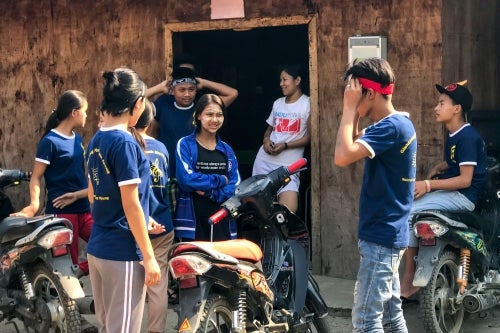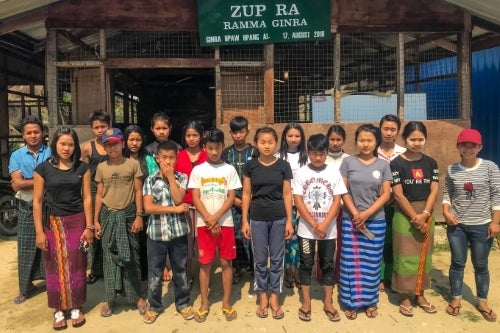News
In Myanmar communities torn apart by conflict, youth centres nurture health, learning and well-being
- 21 October 2019
News
BHAMO, Myanmar – “My job is to help these boys and girls steer their dreams in the right direction for their future.”
Mung Do, 25, is a youth leader at the UNFPA-supported Woi Chyai Youth Centre in Woi Chyai in Kachin State, a non-government controlled area at the heart of a decades-long armed conflict. Isolated from the world, youth in Kachin grow up in an opportunities vacuum often filled with exploitation, insecurity and displacement.
“There is a beautiful saying in Myanmar that youth are the brightest stars of the nation,” said Mung Do. “But until young people know their own potential, and know what their rights are, this proverb means nothing.”
Adolescents in Kachin, he explained, are at a particularly great risk of being exposed to alcohol, drugs, gambling and brawls and other hazards in their environment, “unless they find somewhere to go and something meaningful to do on a daily basis.”
Millions of young people in Myanmar are profoundly affected by armed conflict. They grow up in communities that have been torn apart, their voices are unheard, and their potential is overlooked. Even if they migrate out of conflict areas as young adults, their high school diplomas are often not valid to enter university, hampering their career prospects. And even if they know their rights, they start at a huge disadvantage.

With limited access to these areas, international organizations must partner with local groups to reach these young people. In Kachin, UNFPA supports three youth-friendly spaces managed by Health Poverty Action and apart of the Women and Girls First Programme supported by Australia, Finland, Italy and Sweden. The centres provide young people with knowledge about their bodies, relationships and health, and also serve youth living in camps for internally displaced people.
Awareness sessions about adolescent sexual and reproductive health and rights enable young people to learn how to protect their bodies and minds from harmful practices like gender-based violence. This has been a growing concern for girls and young women since the conflict re-escalated in 2011, alongside the risk of being trafficked across the border to neighbouring China.
“[Both we] and the girls ... expect their boyfriends to attend those sessions as well. We teach them how to report gender-based violence, and where to receive protection," said Ja San Nu, 24, a youth leader at the Je Yang Youth Centre. "The good thing is that we know that they actually start practicing what they have learned from the centre in real life.”
Data on access to contraceptives and teenage pregnancy show that young people in Kachin need more information about their sexual and reproductive health and rights.
In Kachin, 37 out of 1,000 teenage girls are already mothers, higher than the national adolescent fertility rate of 33. At the same time, women of all ages in Kachin struggle to access modern family planning. Kachin's contraceptive prevalence rate of 41.6 per cent is significantly lower than the national average of 51 per cent.

Lack of knowledge about family planning leads to unwanted pregnancy, unsafe abortion and an increased risk of maternal death among already vulnerable teenage girls. Accurate and reliable information, on the other hand, allows them to make informed decisions and gives them the confidence to make the right choices.
“Naturally, girls and boys around 12-15 years old are very curious to know about their bodies," said Ja San Nu. "When given at the right time in their development and with suitable content, the sexual and reproductive health sessions respond to their curiosity and foster healthy lifestyles. For them, what could be more useful than that?”
In Myanmar, youth are often seen as beneficiaries of what the elders have done, rather than as the age group that will take the country’s development forward into the future. This cultural construction underscores the importance of empowering the country's youth to ensure they know they have a right to the information and services they need to protect their health and their future.
“For young people in marginalized areas, the youth centres build their self-confidence to take control of their health and well-being,” said Dr. Mahkawnghta Awng Shar, a UNFPA programme analyst.
Each centre is also a place for fun. Youth leaders, explained Dr. Shar, deliberately create opportunities for girls and boys to explore their interests in sports, games and team activities.
"The centres are friendly spaces for youth in the midst of protracted conflict.”
– Thein Zaw Win